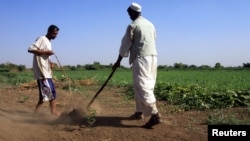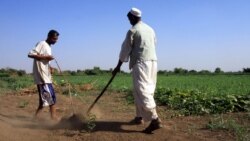Around the world, more than 870 million people, or one in eight, suffer from chronic hunger. The majority of them live in developing countries. Growth in the agricultural sector is, on average, at least twice as effective in reducing poverty as growth in other sectors, so to help reduce poverty and improve the food security and nutrition of some of the world’s poorest, the Obama Administration launched the Feed the Future initiative.
With a focus on smallholder farmers, particularly women, Feed the Future helps countries develop their own agricultural sectors to increase economic opportunities and incomes for farmers and help build resilience.
Feed the Future emphasizes innovation, supports efforts to help smallholder farmers sustainably increase food production, adapt to climate change, and increase the adoption of transformative technologies and innovations.
In late July, USAID Administrator Dr. Rajiv Shah announced the launch of two new Feed the Future Innovation Laboratories that will work to improve climate resilience in some of Africa’s main cereal crops and increase private sector investment that can help smallholder farmers.
The Feed the Future Innovation Lab for Collaborative Research on Sorghum & Millet will be led by Kansas State University. U.S. researchers and partner country scientists will address key constraints along the sorghum and pearl millet value chains, to develop new technologies that can then be used by smallholder farmers on a larger scale to increase productivity and sustainability.
The technologies and innovative approaches developed through this program aim to help improve resilience in dryland areas, where sorghum and pearl millet are critical to food security.
The second laboratory, the Feed the Future Innovation Lab for Food Security Policy, will be led by a consortium including Michigan State University, the International Food Policy Research Institute and the University of Pretoria. The lab aims to help increase the capacity of partner countries to find and implement improved food security policies that can help facilitate greater food security and nutrition.
Both Innovation Labs will also help partner countries strengthen the next generation of agricultural science and policy leaders through higher education opportunities and by helping build the institutional capacity of local and national organizations.
As Dr. Shah has said before, “By embracing high-impact partnerships, science, and technology, we can achieve progress simply unimaginable in the past, including the end of extreme poverty, widespread hunger and chronic malnutrition.”
With a focus on smallholder farmers, particularly women, Feed the Future helps countries develop their own agricultural sectors to increase economic opportunities and incomes for farmers and help build resilience.
Feed the Future emphasizes innovation, supports efforts to help smallholder farmers sustainably increase food production, adapt to climate change, and increase the adoption of transformative technologies and innovations.
In late July, USAID Administrator Dr. Rajiv Shah announced the launch of two new Feed the Future Innovation Laboratories that will work to improve climate resilience in some of Africa’s main cereal crops and increase private sector investment that can help smallholder farmers.
The Feed the Future Innovation Lab for Collaborative Research on Sorghum & Millet will be led by Kansas State University. U.S. researchers and partner country scientists will address key constraints along the sorghum and pearl millet value chains, to develop new technologies that can then be used by smallholder farmers on a larger scale to increase productivity and sustainability.
The technologies and innovative approaches developed through this program aim to help improve resilience in dryland areas, where sorghum and pearl millet are critical to food security.
The second laboratory, the Feed the Future Innovation Lab for Food Security Policy, will be led by a consortium including Michigan State University, the International Food Policy Research Institute and the University of Pretoria. The lab aims to help increase the capacity of partner countries to find and implement improved food security policies that can help facilitate greater food security and nutrition.
Both Innovation Labs will also help partner countries strengthen the next generation of agricultural science and policy leaders through higher education opportunities and by helping build the institutional capacity of local and national organizations.
As Dr. Shah has said before, “By embracing high-impact partnerships, science, and technology, we can achieve progress simply unimaginable in the past, including the end of extreme poverty, widespread hunger and chronic malnutrition.”






